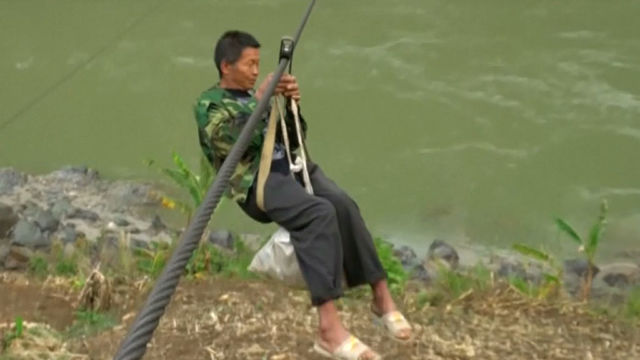For many of us, getting around town might involve a car, a bike or maybe a scooter.
But in one village in China, residents navigate with a tricky balancing act.
CGTN’s Frances Kuo has more.
In the mountain village of Lazimi in China’s southern Yunnan Province, the life of residents seemingly hangs by a thread.
When the village’s ethnic Lisus need to cross the river to get to the other side, they put on a harness, attach themselves to a cable, let gravity take over and say a prayer.
Cha Huilan frequently makes a nail-biting zip line trip to buy medicine for her sick mother.
During the journey, she holds onto her two-year-old child for dear life.
“It’s inconvenient,” said Cha Huilan, a villager. “But we have to use it. Transportation here is inconvenient. If you don’t use it, then we can’t get across.”
The river is menacingly named “nu” – translated to “angry” in Chinese.
To the residents, the zip line is the only viable form of transportation – the rapids below are too rough to navigate and the isolated area lacks proper roads and bridges.
“If they built a bridge then that would be nice, but for now we can’t get over there,” said Cha.
And when it rains, slippery conditions make the trek even more dangerous.
“And at that time, it’s difficult to use the zip-line,” said villager Yu Zhengtou.
It’s believed 20 to 30 villages in the Nu River area still use zip lines to get around.
Visitors, for their part, think they can get over just fine on the ground, then run into trouble.
“What I’m saying is that outsiders can’t really use the zip-line. It’s difficult for them,” said Yu. “Sometimes when the roads across the river are bad, their cars get stuck.”
For the ethnic Lisus, they’re stuck with these treks for now, waiting for someone to throw them a lifeline.
 CGTN America
CGTN America

